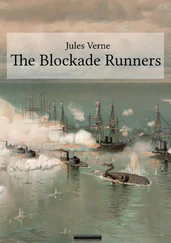At the top of Baring Bay there is a narrow channel which puts Wellington and Queen’s Channel into communication with each other. There the rafts of ice lie closely packed. Hatteras tried, in vain, to clear the passes to the north of Hamilton Island; the wind was contrary; five precious days were lost in useless efforts. The temperature still lowered, and, on the 19th of July, fell to 26 degrees; it got higher the following day; but this foretaste of winter made Hatteras afraid of waiting any longer. The wind seemed to be going to keep in the west, and to stop the progress of the ship. However, he was in a hurry to gain the point where Stewart had met with the open sea. On the 19th he resolved to get into the Channel at any price; the wind blew right on the brig, which might, with her screw, have stood against it, had not Hatteras been obliged to economise his fuel; on the other hand, the Channel was too wide to allow the men to haul the brig along. Hatteras, not considering the men’s fatigue, resolved to have recourse to means often employed by whalers under similar circumstances. The men took it in turns to row, so as to push the brig on against the wind. The Forward advanced slowly up the Channel. The men were worn out and murmured loudly. They went on in that manner till the 23rd of July, when they reached Baring Island in Queen’s Channel. The wind was still against them. The doctor thought the health of the men much shaken, and perceived the first symptoms of scurvy amongst them; he did all he could to prevent the spread of the wretched malady, and distributed limejuice to the men.
Hatteras saw that he could no longer count upon his crew; reasoning and kindness were ineffectual, so he resolved to employ severity for the future; he suspected Shandon and Wall, though they dare not speak out openly. Hatteras had the doctor, Johnson, Bell, and Simpson for him; they were devoted to him body and soul; amongst the undecided were Foker, Bolton, Wolsten the gunsmith, and Brunton the first engineer; and they might turn against the captain at any moment; as to Pen, Gripper, Clifton, and Warren, they were in open revolt; they wished to persuade their comrades to force the captain to return to England. Hatteras soon saw that he could not continue to work his ship with such a crew. He remained twenty-four hours at Baring Island without taking a step forward. The weather grew cooler still, for winter begins to be felt in July in these high latitudes. On the 24th the thermometer fell to 22 degrees. Young ice formed during the night, and if snow fell it would soon be thick enough to bear the weight of a man. The sea began already to have that dirty colour which precedes the formation of the first crystals. Hatteras could not mistake these alarming symptoms; if the channels got blocked up, he should be obliged to winter there at a great distance from the point he had undertaken the voyage in order to reach, without having caught a glimpse of that open sea which his predecessors made out was so near. He resolved, then, to gain several degrees further north, at whatever cost; seeing that he could not employ oars without the rowers were willing, nor sail in a contrary wind, he gave orders to put steam on again.
CHAPTER XXII
BEGINNING OF REVOLT
Table of Contents
At this unexpected command, the surprise was great on board the Forward .
“Light the fires!” exclaimed some.
“What with?” asked others.
“When we’ve only two months’ coal in the hold!” said Pen.
“What shall we warm ourselves with in the winter?” asked Clifton.
“We shall be obliged to burn the brig down to her waterline,” answered Gripper.
“And stuff the stove with the masts,” added Warren. Shandon looked at Wall. The stupefied engineers hesitated to go down to the machine-room.
“Did you hear me?” cried the captain in an irritated tone.
Brunton made for the hatchway, but before going down he stopped.
“Don’t go, Brunton!” called out a voice.
“Who spoke?” cried Hatteras.
“I did,” said Pen, advancing towards the captain.
“And what did you say?” asked Hatteras.
“I say,” answered Pen with an oath—“I say, we’ve had enough of it, and we won’t go any further. You shan’t kill us with hunger and work in the winter, and they shan’t light the fires!”
“Mr. Shandon,” answered Hatteras calmly, “have that man put in irons!”
“But, captain,” replied Shandon, “what the man says–-“
“If you repeat what the man says,” answered Hatteras, “I’ll have you shut up in your cabin and guarded! Seize that man! Do you hear?” Johnson, Bell, and Simpson advanced towards the sailor, who was in a terrible passion.
“The first who touches me–-” he said, brandishing a handspike. Hatteras approached him.
“Pen,” said he tranquilly, “if you move, I shall blow out your brains!” So speaking, he cocked a pistol and aimed it at the sailor. A murmur was heard.
“Not a word, men,” said Hatteras, “or that man falls dead!” Johnson and Bell disarmed Pen, who no longer made any resistance, and placed him in the hold.
“Go, Brunton,” said Hatteras. The engineer, followed by Plover and Warren, went down to his post. Hatteras returned to the poop.
“That Pen is a wretched fellow!” said the doctor.
“No man has ever been nearer death!” answered the captain, simply.
The steam was soon got up, the anchors were weighed, and the Forward veered away east, cutting the young ice with her steel prow. Between Baring Island and Beecher Point there are a considerable quantity of islands in the midst of icefields; the streams crowd together in the little channels which cut up this part of the sea; they had a tendency to agglomerate under the relatively low temperature; hummocks were formed here and there, and these masses, already more compact, denser, and closer together, would soon form an impenetrable mass. The Forward made its way with great difficulty amidst the snowstorms. However, with the mobility that characterises the climate of these regions, the sun appeared from time to time, the temperature went up several degrees, obstacles melted as if by magic, and a fine sheet of water lay where icebergs bristled all the passes. The horizon glowed with those magnificent orange shades which rest the eye, tired with the eternal white of the snow.
On the 26th of July the Forward passed Dundas Island, and veered afterwards more to the north; but there Hatteras found himself opposite an ice-bank eight or nine feet high, formed of little icebergs detached from the coast; he was obliged to turn west. The uninterrupted cracking of the ice, added to the noise of the steamer, was like sighs or groans. At last the brig found a channel, and advanced painfully along it; often an enormous iceberg hindered her course for hours; the fog hindered the pilot’s lookout; as long as he can see for a mile in front of him, he can easily avoid obstacles; but in the midst of the fog it was often impossible to see a cable’s length, and the swell was very strong. Sometimes the clouds looked smooth and white as though they were reflections of the ice-banks; but there were entire days when the yellow rays of the sun could not pierce the tenacious fog. Birds were still very numerous, and their cries were deafening; seals, lying idle on the floating ice, raised their heads, very little frightened, and moved their long necks as the brig passed. Pieces from the ship’s sheathing were often rubbed off in her contact with the ice. At last, after six days of slow navigation, Point Beecher was sighted to the north on the 1st of August. Hatteras passed the last few hours at his masthead; the open sea that Stewart had perceived on May 30th, 1851, about latitude 76 degrees 20 minutes, could not be far off; but as far as the eye could reach, Hatteras saw no indication of it. He came down without saying a word.
Читать дальше












